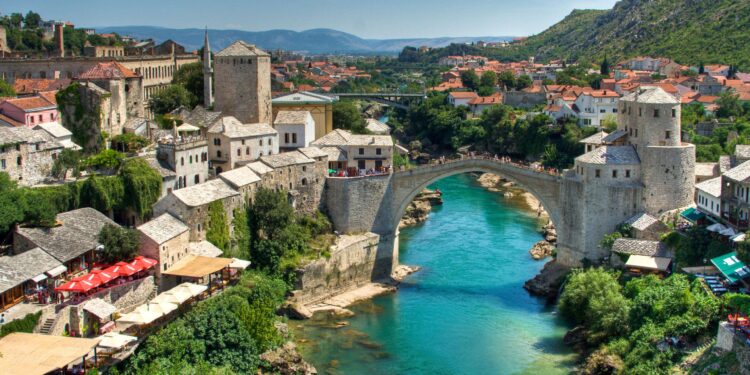Bosnia and Herzegovina remains a focal point in the European Union’s agenda as Brussels continues to engage closely with the Western Balkans. Recent developments highlighted on the official consilium.europa.eu platform underscore the EU’s commitment to supporting the country’s political stability, economic reform, and integration prospects. Against a backdrop of complex internal dynamics and regional challenges, the EU’s diplomatic efforts aim to pave the way for Bosnia and Herzegovina’s closer alignment with European standards and values. This article explores the latest updates from the Council of the European Union concerning Bosnia and Herzegovina, shedding light on ongoing initiatives and future outlooks.
Bosnia and Herzegovina’s EU Integration Challenges and Opportunities
Bosnia and Herzegovina stands at a critical juncture in its European Union accession process, facing a complex blend of political, economic, and social challenges. The country’s intricate constitutional setup, inherited from the Dayton Agreement, continues to impede swift decision-making and reform implementation. Key hurdles include institutional fragmentation and persistent ethnic divisions, which undermine the consistent application of EU standards in governance, rule of law, and human rights protections. Despite these obstacles, extensive negotiations have highlighted areas where progress could be accelerated, particularly in judicial reform and anti-corruption measures, essential for gaining the trust of EU member states.
On the opportunity front, Bosnia and Herzegovina benefits from strong international support and increasing alignment with EU frameworks, which could serve as a catalyst for sustainable development. The government’s commitment to upgrade infrastructure and foster regional cooperation suggests significant potential for economic growth and social stability. Notable areas ripe for development include:
- Green Transition Initiatives: Emphasis on renewable energy projects to meet EU climate goals.
- Digital Integration: Enhancing connectivity and e-governance systems for improved transparency.
- Youth Engagement Programs: Initiatives to reduce brain drain and invigorate civic participation.
| Sector | Current Status | Potential EU Impact |
|---|---|---|
| Judiciary | Partial reforms ongoing | Enhanced rule of law and fairness |
| Energy | High reliance on fossil fuels | Shift towards sustainable sources |
| Governance | Fragmented administrative structures | Streamlined institutions and efficiency |
Addressing Governance and Rule of Law Reforms for Sustainable Progress
Strengthening governance structures and reinforcing the rule of law remain pivotal for Bosnia and Herzegovina’s path toward sustainable development and EU integration. Recent efforts have focused on enhancing institutional transparency, combating corruption, and ensuring judicial independence to build public trust. These reforms are not only necessary for political stability but also critical to attract foreign investment and foster economic growth. Key actors within Bosnia and Herzegovina, supported by international partners, are prioritizing the overhaul of legal frameworks and administrative practices to align with European standards.
Successful implementation hinges on a multifaceted approach that includes:
- Judicial modernization: Introducing digital platforms to improve case management and reduce backlog.
- Anti-corruption measures: Establishing independent bodies tasked with transparent investigations and prosecutions.
- Decentralization of power: Promoting local governance reforms to enhance citizen engagement and accountability.
- Legislative harmonization: Aligning domestic laws with EU acquis to facilitate smoother integration processes.
| Reform Area | Status | Impact |
|---|---|---|
| Judicial Independence | In Progress | Enhanced fair trial guarantees |
| Anti-Corruption Policies | Ongoing | Improved transparency |
| Administrative Modernization | Initial Phase | Efficiency in public services |
| Legal Harmonization | Advanced | Facilitated EU integration |
Strategic Recommendations for Strengthening Regional Stability and Cooperation
To effectively bolster regional stability and foster enhanced cooperation, a multi-faceted approach is essential. Prioritizing institutional reforms that promote transparency and the rule of law will lay a solid foundation for trust among local and international stakeholders. Furthermore, enhancing cross-border economic initiatives is crucial to stimulate growth and interdependence, reducing the risk of conflict. Key measures should include:
- Strengthening judicial independence and anti-corruption agencies
- Promoting inclusive political dialogue among Bosnia and Herzegovina’s constituent peoples
- Facilitating joint infrastructural projects linking transport and energy sectors
- Encouraging civil society engagement to support peacebuilding efforts
| Focus Area | Recommended Action | Expected Outcome |
|---|---|---|
| Governance | Enhance electoral transparency | Increased citizen trust |
| Economic Integration | Launch regional trade agreements | Boosted cross-border commerce |
| Security Cooperation | Joint training programs | Improved coordination |
| Civil Society | Support NGO capacity-building | Stronger social cohesion |
Engagement with regional partners, including neighboring countries and EU institutions, should be accelerated to ensure Bosnia and Herzegovina’s trajectory aligns with broader European stability goals. By embedding these recommendations within a strategic framework, all actors involved can contribute to a durable peace and an environment conducive to sustainable development.
Future Outlook
As Bosnia and Herzegovina continues its path towards European integration, the European Union remains a key partner in supporting the country’s political stability, economic development, and reform agenda. The ongoing dialogue and cooperation highlighted on consilium.europa.eu underscore the EU’s commitment to fostering peace and prosperity in the Western Balkans. Moving forward, sustained engagement and concrete progress will be essential for Bosnia and Herzegovina to meet the criteria for closer ties with the European Union, reflecting both regional aspirations and broader strategic interests.
















